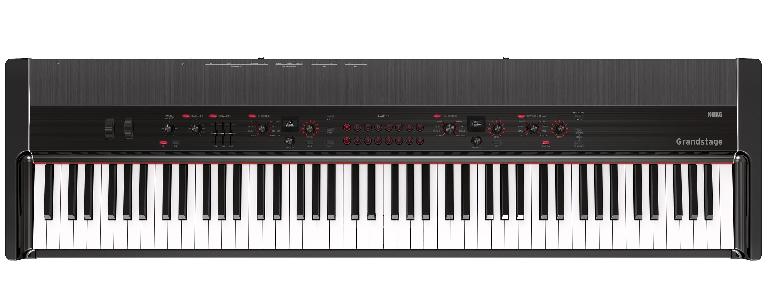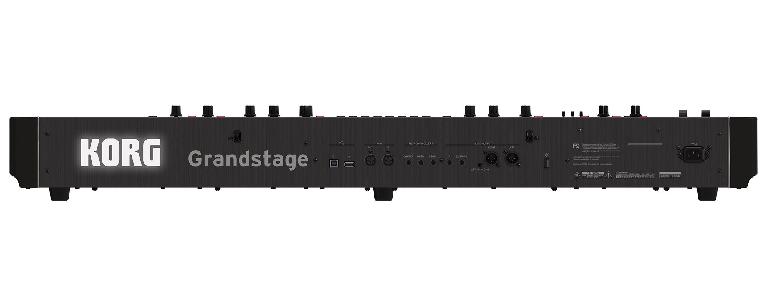The release of the Korg Grandstage took Korg’s keyboard line in an entirely new direction. Rather than a ‘million preset monster’, the Grandstage is a much more focused effort. The flagship piano engine from the Kronos is present, but so is a smattering of specifically curated sounds to enhance the collection into a ‘one button per function’ interface that is getting more and more popular these days. I’ve spent a month with mine so far, and I’m excited to share the results.
The Physical Nature
The physical build and layout of this keyboard is important, perhaps more so than the Kronos or other workstations because of the tactile nature of the instrument. Eschewing a touchscreen, this keyboard has a variety of physical buttons and controls that are all mapped to common functions. The keyboard itself is well made, the keys have the familiar Korg RH3 action and keybed present in the Kronos, and the ‘look’ is extremely sleek and classy. The Grandstage comes in a 73 and 88 key variant; I tested the 88. The keyboard is heavy, but not overly so.
Focused Features
While this keyboard shares many of the engines and sounds of the Kronos, feature-wise it has a few really interesting tricks up its sleeve. Where a typical workstation may take a large investment in time to create a single split or layer, the Kronos tackles that with a single button press. There are physical controls for EQ, reverb, delay, and dynamics all on the front panel. Instrument banks are all accessible with a dial, and there is a built-in music stand. The keyboard itself sports XLR output as well as 1/4” for ease of use with a standard PA system without the need for a direct box. The built-in ground lift was a nice touch as well! There is USB I/O as well as a standard port that can handily keep your iPad / music reader charged in a pinch! Really, everything about this keyboard absolutely screams “A gigging keyboardist designed this”.
The Grandstage Sound
Whoever picked out the sounds to include in the Grandstage really deserves some time in the spotlight here. I love my Kronos, but sometimes picking a sound can be overwhelming. The absolute best 5-6 options of each sound category are included on the Grandstage, and this makes picking and finding a sound lightning quick. With physical buttons for splitting/layering the keyboard, you can actually compile quick dual-timbre sounds with astonishing speed.
Don’t let the lack of LCD touchscreen fool you, either. You can tap the ‘edit’ button, dial in, and get control of a variety of effects included on each sound. Adjusting the phaser speed on the Wurly, for example, is a cinch. Of course, you don’t have 50 different virtual effects to choose from as you do on a full-fledged workstation - but the 2-3 variants they’ve chosen and curated for each sound on the Grandstage are the one’s you’d likely use anyway. Again, focused.
Conclusion
I’m not going to hold back here, the Grandstage is one of the best keyboards I’ve had a chance to play in a long time. Korg ‘called their shot’ and defined a specific type of keyboard they were looking to create and when it was time to ship… they knocked it out of the park. The Grandstage is packed with loads of tech, but it gets it out of your way so you can make music that sounds good very quickly.
Pros: Fantastic sounds, excellent curated patch choices, XLR outs, deep editing choices for such a small screen, critical knobs all on the keyboard face within reach, physical master EQ section, ground lift (really, why don’t they all have this now?), sleek look, fun included keyboard stand.
Cons: None. This keyboard does exactly what it is supposed to do, and it does it EXTREMELY well.
Web: www.korg.com/grandstage




 © 2024 Ask.Audio
A NonLinear Educating Company
© 2024 Ask.Audio
A NonLinear Educating Company
Discussion
Want to join the discussion?
Create an account or login to get started!